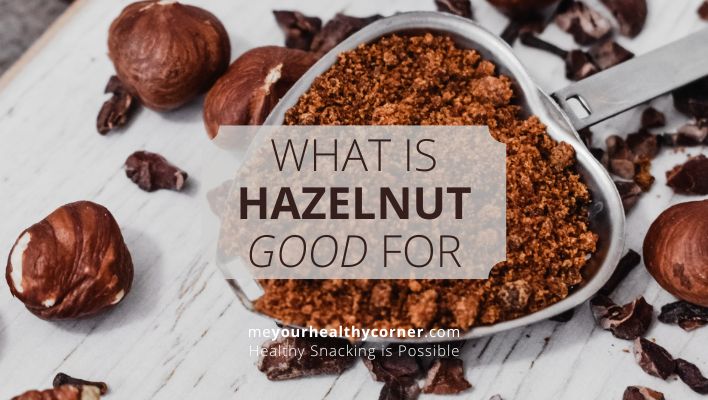Hazelnuts are more than just an addition to your snack selection or a baking ingredient. They are nutritious and can have a good impact on your health. While I mostly use hazelnuts in my baking, it’ll be good to know how else you and I can include them in our diet for better health. In this blog post, let’s explore the incredible benefits of hazelnuts and the wholesome ways to enjoy them. Read on…
Health Benefits Eating Hazelnuts
If you have been asking is hazelnut good for health? Here are 7 benefits you ought to know
1. Heart Health

Similar to almonds and walnuts, hazelnuts benefit heart health too.
Hazelnuts are rich in monounsaturated fats, which have been associated with improved cardiovascular health.
According to a study published in the National Library of Medicine, a diet high in monounsaturated fats, such as those found in hazelnuts, can reduce the risk of cardiovascular disease. It shows hazelnut-enriched diet is associated with a decrease in LDL and total cholesterol, while HDL cholesterol, triglycerides and BMI remain substantially unchanged.
2. Weight Management
A couple of studies indicate that nuts like hazelnuts can play a role in weight management. (1, 2)
Nuts are calorie-dense but can increase feelings of fullness due to their high fibre and protein content. This satiety effect may reduce overall calorie consumption, making them a valuable tool in supporting weight loss and maintenance.
Having said that, I like to remind you that portion control is key to healthy eating. One can easily snack on roasted nuts without realising you’ve eaten too much.
3. Improved Digestion
Hazelnuts are a good source of dietary fibre (1), which supports digestive health. A study in the National Library of Medicine found that dietary fibre aids in regular bowel movements, reduces the risk of constipation, and contributes to overall digestive well-being.
If you struggle with constipation, it is a good idea to include hazelnuts in your daily meal. How? Read on to find out how you eat hazelnuts and how many should you eat a day.
4. Rich in Antioxidants
You need to understand antioxidants protect your body from oxidative stress, which can damage cell structure. (1)
Hazelnuts are indeed rich in antioxidants, also known as phenolic compounds. They are proven to help decrease blood cholesterol and inflammation. Also, can be beneficial for heart health and protecting against cancer. (1, 2)
An 8-week study showed that eating hazelnuts significantly decreased oxidative stress compared to not eating hazelnuts.
5. Bone Health

Maintaining strong and healthy bones is a critical component of overall well-being, and adequate intake of certain minerals is crucial.
As I age, bone health is important to me hence, I’ve read more on this topic and shared it here.
There is a mention in the National Library of Medicine that the process of bone formation requires an adequate and constant supply of nutrients which include calcium, magnesium, phosphorus and potassium. Copper is important too as it is needed for metabolic processes related to bone health. (1)
Hazelnuts are a source of the minerals mentioned above. While not exceptionally rich in all bone-essential minerals, they do contribute to supporting bone health through their mineral content. Let’s look into it one by one.
Calcium
Hazelnuts contain approximately 2% of the daily value (DV) of calcium per one-ounce (28g) serving. While they are not a primary source of calcium, they can still contribute to your daily intake when consumed alongside other calcium-rich foods.
Magnesium
Hazelnuts provide approximately 11% DV for magnesium per one-ounce (28g) serving. This substantial contribution makes them a valuable source of this essential mineral for overall bone health.
Phosphorus
While hazelnuts do contain phosphorus, the amount is relatively low, contributing to around 7% of the DV per one-ounce (28g) serving. Other dietary sources may be more significant for meeting your phosphorus needs. Then again, together with other minerals found in hazelnuts, it will add up to support healthy bones.
Potassium
Hazelnuts offer approximately 4% of the DV for potassium per one-ounce (28g) serving. Not much, but look at what it did in this study. A total of 3,135 men aged >50 years and 4,052 postmenopausal women from the Korean National Health and Nutrition Examination Survey (KNHANES) participated. It concluded that dietary potassium intake was positively associated with bone mineral density indicating the beneficial effects of dietary potassium intake on bone health.
Copper
Hazelnuts provide about 54% of the DV for copper per one-ounce (28g) serving. Copper plays a crucial role in maintaining healthy bones, as it is involved in the formation of collagen and elastin, which are essential components of bone tissue. (1)
Source: NutritionValue.Org
The % Daily Value (DV) tells you how much a nutrient in a serving of food contributes to a daily diet. 2000 calories a day is used for general nutrition advice.
6. Balanced Blood Sugar
The healthy fats, fibre, and protein in hazelnuts can help stabilize blood sugar levels, which is crucial for overall health.
Maintaining balanced blood sugar is important because it prevents rapid spikes and crashes in energy levels. Fluctuations in blood sugar can lead to feelings of fatigue, irritability, and hunger, which may result in overeating and poor food choices.
An 8-week study explored the effect of hazelnuts on fasting blood sugar levels in 48 people with type 2 diabetes. Half participants consumed hazelnuts as a snack, while the other half served as a control group. The result showed the hazelnut group did not experience significant reductions in fasting blood sugar levels.
However, in another study, a 12-week feeding trial, 50 participants with metabolic syndrome were given a combination of 30 grams of mixed nuts — 15 grams walnuts, 7.5 grams almonds and 7.5 grams hazelnuts, showed a significant reduction in fasting insulin levels.
By and large, consuming hazelnuts may not sufficiently help control your blood sugar level but together with other nuts, it helps. In this case, consider snacking on trail mix to maintain balanced blood sugar. Read more about trail mix here.
7. Brain Health
Hazelnuts contain vitamin E and other antioxidants that support brain health. A review published in the National Library of Medicine highlights the potential benefits of vitamin E and antioxidants in reducing cognitive decline and protecting brain cells from damage.
Hazelnuts provide about 28% of the daily value (DV) for Vitamin E (alpha-tocopheral) per one-ounce (28g) serving and that is a fairly good amount.
By incorporating hazelnuts into your diet, you are not only enjoying their delightful taste but also benefiting from these scientifically-backed health advantages. Hazelnuts can be a vital component of your journey to better health.
How Many Hazelnuts Should You Eat a Day
Now that you’re aware of the remarkable health benefits of hazelnuts, you may wonder, “How many should I consume daily?”
The ideal daily intake varies based on individual factors. A handful, around 1-2 ounces (about 20-25 hazelnuts), is a good starting point.
However, you may want to consult with a nutritionist to determine the right portion for your specific needs.
How Do You Eat Hazelnuts – It’s Easy, Really
Incorporating hazelnuts into your daily diet is easier than you might think. Here are some creative and wholesome ways to enjoy hazelnuts:
SNACKING
A handful of hazelnuts makes for a convenient and nutritious snack.
Remember we talked about hazelnuts’ effectiveness in managing balanced blood sugar above? It would be better to consume hazelnuts with other nuts, also known as trail mix if you intend to control your blood sugar.
It is easy and fun to build your own trail mix.

ADDING TO MEALS
Sprinkle chopped hazelnuts on salads, yoghurt, or oatmeal for added flavour and crunch.
I use hazelnuts in my baking, especially for baking bread and granola. Also, add to my morning oatmeal and overnight oats. Give it a try if you haven’t already.
HAZELNUT PRODUCTS
Explore the world of hazelnut butter or use hazelnut flour in baking for a unique twist.
Do you fancy spreading nut butter onto your toast or pancakes? Yummy, right?
Here is a simple 3-ingredient recipe, Cinnamon Hazelnut Butter, which I found on Minimalist Baker, a website I follow.
Learn the benefits of cinnamon here.
I get it. Not everyone is up to making nut butter. I have tried a couple of times and decided not to until I get a good high-powered blender.
If you’re not making your own, you can easily buy hazelnut butter online.
For US Readers, I found a few for you on Amazon US (Affiliate links*)

NUTELLA Hazelnut Spread
A household brand that needs no introduction. This comes in a glass jar, imported from Europe.

ARTISANA ORGANICS Hazelnut Cacao Spread
Free of palm oil and sweetened with coconut sugar. Try this!

PONGO Cocoa Hazelnut Protein Spread
If sugar is your concern, this is for you. This product is from a small business brand who claims their hazelnut paste features 3x the amount of protein and 77% less sugar than other hazelnut chocolate spreads. And, they don’t use artificial sweeteners or cane sugar. Palm oil free.
For my fellow Malaysians, there is a good selection on Shoppe and Lazada. Click on my affiliate link* and it will take you directly to the page.
*I receive a small commission at no extra cost to you. This allows me to enjoy a cup of coffee while writing and sharing more articles like this one.
Briefly, Hazelnuts Nutrition Facts
To truly appreciate hazelnuts, it’s important to understand their nutritional profile. Here’s a breakdown:
A one-ounce (28g) serving of hazelnuts gives you
- Calories 178
- Total Fat: 17g (22% DV)
- Total Carbohydrate 4.7g (2% DV) and contains mostly dietary fibre at 2.8g (10%DV)
- Protein: 4.2g (8% DV)
*The Daily Value (DV) percentage tells you how much a nutrient contributes to your daily diet in a serving.
The mineral content may not be impressive compared with almonds and pecan but its copper content is a good amount giving you 54% DV.
Vitamins worth mentioning here are Vitamin E 28% DV and Vitamin B1 15% DV.
In a Nutshell

Hazelnuts are indeed a gift from nature. Their remarkable health benefits, ideal daily intake, and versatile use in your meals make them a valuable addition to your diet. By incorporating hazelnuts, you’re investing in your health and enjoying the journey towards a healthier you.
Whether you’re snacking, cooking, or experimenting with hazelnut-based recipes, make hazelnuts a part of your daily routine and savour the difference they bring to your well-being.
Is hazelnut good for health? I hope this article has given you a good idea of the health benefits eating hazelnuts. Tell us in the comments section below if you will start consuming hazelnuts or would rather go for other types of nuts that are healthier.
If you’re from where I am, Malaysia, don’t forget to explore my homemade granola clusters for a truly healthy and delicious experience. Products are on Facebook and Instagram.
Please share this article with anyone you think may find this information useful. Click the share button!
You may like to read more…
- What are pumpkin seeds good for
- How healthy is muesli? What’s the best way to eat muesli
- Does fat in food make you fat
Thanks for reading.
Me YourHealthy Corner – Stay in good health, healthy eating habits
Disclosure: This blog post may contain affiliate links as part of the Amazon.com Services LLC Associate Programs and other affiliate services. This means that meyourhealthycorner.com receives a small commission by linking to amazon.com and other sites at no extra cost to the readers.
Medical Disclaimer: I am not a doctor or medical professional, and this post should not be taken as medical advice. Please do your own research. The material on this blog is provided for informational purposes only. It is general information that may not apply to you as an individual and is not a substitute for your own doctor’s medical care or advice.



Hazelnuts indeed possess numerous health benefits, Sharon. Thanks for enlightening me about them.
The most appealing benefit to me is improved heart health. I believe I have a relatively high resting heart rate, and I am actively looking for ways to improve my cardiovascular health.
Incorporating cardio training into my routine is definitely helping, but looking at healthy snacks like hazelnuts should definitely not go unnoticed.
Exercising and healthy food go hand-in-hand. It’s good to know you’re taking the right steps toward a healthier you. Take care!
Thank you for leaving a comment.
Hey thank you for this post!
I really enjoyed reading this post! To be honest I haven’t eaten a hazelnut in a while only a few times when it might have come across in one of my desserts or cereal since I am a massive fan sweet foods, anyways I was saying hazelnut is something which I certainly need to incorporate into my diet especially after reading all the benefits you have kindly mentioned here! They are quite tasty too right?
Thanks again and Have a great day!
Hazelnuts are slightly sweet and earthy. You know what? If you’re a coffee lover, hazelnut is a perfect match. Thanks for reading my post and you have a great day too!